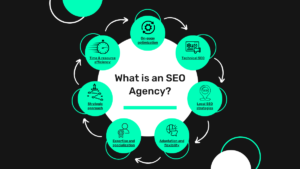Introduction:
In the vast digital marketing landscape, Search Engine Optimization (SEO) has emerged as a vital tool for businesses to enhance their online visibility, attract organic traffic, and drive sustainable growth. In today’s highly competitive digital world, understanding the role of SEO and leveraging its potential can make a significant difference in the success of any online venture. In this article, we will explore the fundamental role of SEO in digital marketing and its impact on businesses.
Enhancing Online Visibility:
In the digital marketing landscape, online visibility is crucial for businesses to reach their target audience effectively. Search Engine Optimization (SEO) is vital in enhancing a website’s visibility on search engine result pages (SERPs). By implementing effective SEO techniques, businesses can improve their rankings and increase their chances of being discovered by potential customers.
One of the critical aspects of enhancing online visibility is optimizing the website’s structure. This involves ensuring the website is properly organized, with straightforward navigation and user-friendly URLs. A well-structured website makes it easier for search engines to crawl and index its pages and provides a seamless user experience, encouraging visitors to stay on the site for longer.
Content optimization is another critical factor in improving online visibility. SEO techniques involve creating high-quality, relevant content that aligns with the target audience’s search intent. By conducting keyword research and incorporating those keywords naturally into the content, businesses can increase the chances of their website appearing in search results when users search for related terms.
User experience optimization is also a key consideration in enhancing online visibility. Website loading speed, mobile responsiveness, and intuitive navigation create a positive user experience. Search engines prioritize websites that provide a smooth and enjoyable browsing experience, so optimizing these elements is essential for improving online visibility.
When a potential customer searches for products or services related to a business, SEO ensures that the website appears prominently in relevant search results. By gaining higher visibility on SERPs, companies increase their chances of attracting qualified leads actively searching for what they offer.
Driving Organic Traffic:
In the digital landscape, organic traffic refers to the visitors who visit a website through unpaid search engine results. SEO strategies are designed to drive organic traffic by optimizing websites to align with search engine algorithms. By doing so, businesses increase their chances of ranking higher in search results, increasing visibility and organic traffic.
A key aspect of driving organic traffic is targeting relevant keywords. Through comprehensive keyword research, businesses can identify the specific terms and phrases their target audience is searching for. By incorporating these keywords strategically into the website’s content, meta tags, headings, and URLs, businesses can signal to search engines the relevance of their website to user queries. As a result, the website becomes more likely to appear in search results when users search for related topics.
On-page optimization is another crucial factor in driving organic traffic. This involves optimizing various elements within the website, such as title tags, meta descriptions, headings, and internal links, to improve the website’s visibility and relevance to search engines. By optimizing these on-page elements, businesses provide search engines with clear signals about the content and purpose of their website, increasing the chances of ranking higher in search results.
Additionally, building high-quality backlinks is an essential part of SEO strategy. Backlinks are links from other reputable websites that point back to a business’s website. Search engines consider backlinks a vote of confidence, indicating that the linked website is trustworthy and valuable. By earning authoritative backlinks, companies can improve their website’s credibility and increase its visibility in search results, leading to more organic traffic.
Building Credibility and Trust:
Search engines consider several factors when ranking websites, including content relevance, quality, and authority. By implementing effective SEO strategies, businesses can create valuable, informative, and user-friendly content that satisfies search engines and users. This approach boosts search engine rankings and establishes credibility and trust with the audience. Higher rankings are often associated with reliability, helping businesses to gain customer trust and establish themselves as industry leaders.
In the competitive online landscape, credibility and trust are crucial for the success of any business. When search engines rank websites, they evaluate the quality and relevance of their content. By implementing effective SEO strategies, companies can create content that meets the criteria set by search engines, such as using relevant keywords, providing comprehensive information, and ensuring a seamless user experience.
By focusing on content relevance, businesses can ensure that their website provides valuable and helpful information to their target audience. This can be achieved through in-depth keyword research to understand the topics and terms their audience is searching for. By incorporating these keywords naturally into their content, businesses can address the needs and interests of their target audience, making their website more relevant and valuable.
Furthermore, businesses can enhance their authority and credibility by earning backlinks from reputable sources. Backlinks are votes of confidence from other trustworthy websites. When search engines see that a website has made backlinks from authoritative sources, it signals that it is reliable and valuable, leading to higher rankings.
Higher search engine rankings are often associated with reliability and expertise. When a website appears on the first page of search results, users perceive it as a reliable source of information. By consistently implementing effective SEO strategies, businesses can gain customer trust, establish themselves as industry leaders, and differentiate themselves from competitors.
Targeting the Right Audience:
One of the significant advantages of SEO is its ability to help businesses target specific demographics, geographical locations, and customer segments. Through thorough keyword research and analysis of user intent, companies can optimize their website content to align with the needs and preferences of their target audience.
Businesses can create content that directly addresses their interests and concerns by understanding the search terms and phrases that their target audience uses. This enables them to attract highly relevant traffic to their website and increase the chances of converting visitors into customers.
In addition to keyword optimization, businesses can leverage other SEO techniques to target the right audience. This includes optimizing meta tags, headings, and URLs to reflect the intent and interests of the target audience. By tailoring these elements to resonate with their audience, businesses can improve their visibility in search results and capture the attention of potential customers.
By targeting the right audience, businesses can increase the effectiveness of their marketing efforts and improve their return on investment (ROI). The traffic generated through organic search is more likely to convert into leads and customers, leading to improved conversion rates and increased revenue.
Cost-Effectiveness and Long-Term Results:
Compared to other digital marketing techniques like paid advertising, SEO provides a cost-effective long-term strategy for sustainable online growth. While paid ads offer immediate visibility, they require continuous investment to maintain effectiveness. In contrast, SEO efforts may take time to yield results but can provide consistent organic traffic and visibility over an extended period.
Once a website ranks well in search results and attracts organic traffic, the benefits can be long-lasting. While ongoing maintenance and optimization are necessary, the compounding effects of SEO can lead to a higher return on investment over time. Without continuous ad spending, businesses can enjoy sustained visibility, increased organic traffic, and improved conversions.
Moreover, SEO allows businesses to target specific audiences and demographics, ensuring their marketing efforts focus on the most relevant and valuable prospects. This precision targeting minimizes wasted ad spend and maximizes the efficiency of marketing budgets.
Conclusion
SEO is pivotal in driving online success by enhancing visibility, driving organic traffic, building credibility, targeting the right audience, and providing long-term results. By incorporating effective SEO strategies into their digital marketing efforts, businesses can establish a solid online presence, outperform competitors, and effectively connect with their target audience. Understanding and harnessing the power of SEO is crucial for companies looking to thrive in the digital realm.




